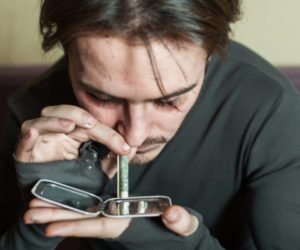Side Effects of Cocaine Addiction

Cocaine addiction treatment at White Sands can help you or a loved one break the addiction cycle
Cocaine is one of the most popular addictive and potent drugs available. It is a powerful stimulant drug that increases the dopamine levels in the brain and has a high potential for abuse and addiction. The side effects of cocaine addiction can cause many problems including psychiatric disorders, disease and death. Cocaine is well-liked as a recreational drug because it increases energy levels, motivation and enhances mood.
Some of the street names for cocaine are toot, coke, flake, C, blow and snow. The drug can be snorted, smoked or injected into a vein. The use of cocaine may cause the addict to become less inhibited and engage in risky behavior. He may have changes in his concentration and focus and experience involuntary body movements such as tics etc. Use of cocaine may cause addiction in the user, and many adverse health effects may begin to manifest. This is what happens when you do coke continuously:
- Respiratory depression
- Agitation
- Increased heart rate, body temperature and blood pressure
- Hyperactivity
- Kidney damage and heart muscle damage
- Strange or bizarre behavior
- Restlessness
- Paranoia
- Violent behavior
- Hallucinations
- Heart attack
- Stoke
- Increased risk for mental and behavioral disorders
- Brain damage
- Rupture of the aorta
- Cell death
- Endocarditis
- Coma and death
The long-term use of cocaine may produce changes in brain chemistry that can increase cravings for the drug. Altered brain chemistry may also affect the behavior of the addict and create psychotic symptoms, erratic behavior and new-onset Attention Deficit Hyperactivity Disorder (ADHD). The cocaine addict will find it more difficult to regulate and control his behavior which may affect his ability to perform daily tasks. The long-term use of the drug may cause impairment of cognition and attention, and also affect executive functions that regulate decision making ability.
Many cocaine addicts suffer from mental disorders such as bi-polar disorder, obsessive-compulsive disorder (OCD), anxiety disorder, depression and Post Traumatic Stress Disorder (PTSD). These co-occurring mental disorders are sometimes the motivation for the addict to self-medicate by using cocaine. Cocaine addiction treatment should include and integrate treatment for the mental disorder. Counseling and medications may help the addict manage his mental disorder more effectively, and not have to turn to cocaine as a solution to his problem.
The use of cocaine creates a strong psychological dependence on the drug. There are many effective cocaine addiction treatment programs that the cocaine addict can receive at a drug rehab center. The addict must decide whether an in-patient or out-patient status will work best for him in his unique situation. The first phase of treatment will be the detox process to wean the cocaine out of the patient’s body. Each individual experiences this process differently depending on the severity of the addiction. Some of the withdrawal symptoms that the cocaine addict may experience are:
- Intense cravings
- Depression
- Irritability
- Anger
- Paranoia
- Hallucinations
- Strange dreams
- Impairment of speech and motor functions
- Fatigue
- Increased appetite
- Suicidal thoughts
Cocaine addiction treatments may include behavioral therapies that attempt to identify the underlying psychological problems that may motivate the addict to use cocaine. Research has shown that this type of therapy is very effective in helping patients who struggle with cocaine abuse and addiction. Contingency management therapy is another psychological treatment that uses incentives and rewards for abstinence and other behaviors such as improved socializing skills. Cognitive behavior therapy helps the patient identify dysfunctional thought and behavior patterns that have to be replaced with positive, healthy alternatives.
Cocaine use was found to be the reason behind 40% of hospital emergency room visits in 2011 according to the National Survey on Drug Use and Health. The drug is very popular among adolescents and with continued use many of them are at a high risk to become addicts. What happens when you do coke at a young age is you risk having psychiatric problems later in life which affects how you will respond to cocaine addiction treatment. Teenagers should be taught the dangers of cocaine abuse and addiction. Anyone with a cocaine addiction problem should seek help at a certified drug rehab center where they will receive the proper treatments for their problems.
Resources:
If you or a loved one needs help with abuse and/or treatment, please call the WhiteSands Treatment at (877) 855-3470. Our addiction specialists can assess your recovery needs and help you get the addiction treatment that provides the best chance for your long-term recovery.
